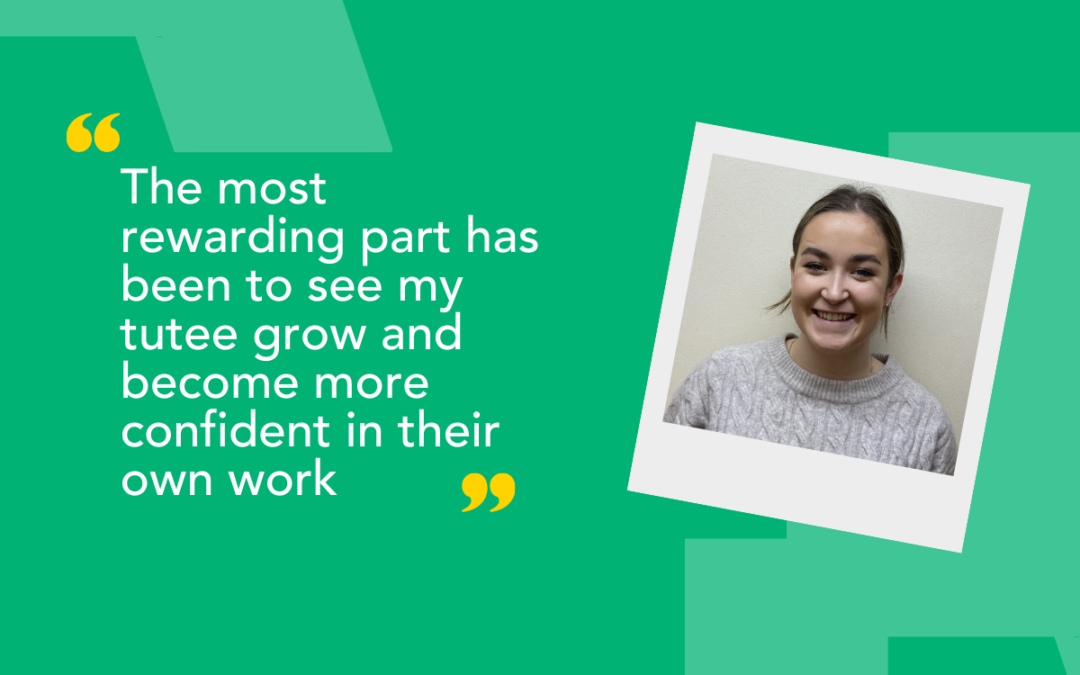It’s Student Volunteering Week, and we’re taking this opportunity to celebrate all of the 134 student volunteer tutors who are giving up their time to support our young pupils.
Today we meet Ruby, an undergraduate from the University of Bristol who signed up to be a volunteer tutor in September 2022.
We asked Ruby about her motivation for becoming a volunteer tutor.
“I volunteered because I believe everyone deserves equal chances in life, especially with education opportunities. It’s a great feeling knowing that you’re helping someone else out especially when you volunteer.”
The rewards of volunteering
Ruby went on to speak about the best bits about being a volunteer tutor.
“The most rewarding part has been to see my tutee grow and become more confident in their own work. Knowing I am helping someone is such a satisfying feeling. It is also rewarding to know that I am also benefitting from the project because it’s a good opportunity for me to develop and discover new skills that I wouldn’t have had the opportunity to experience yet or the time to put into practice in lectures.
It’s helping to build me as a person, as well as providing the extra support for the tutees in their chosen subject. This also looks great on your CV.
You really get a sense of how grateful everyone is for providing some of your time to help other when volunteering with the Access Project.”
The challenges of volunteering
We also spoke to Ruby about the more challenging parts of her volunteering role.
“It has been interesting being on the other side of the classroom. You need to have the depth of knowledge of a topic to be able to teach it and enough patience to find alternative ways to approach this. This has meant that I have had to approach certain topics in a different way… now I am teaching it you have to go more into the why and how it works. This depth, even at GCSE level, has also helped me to understand concepts I’m learning at university better.
It can be difficult but The Access Project is a massive help by providing teaching plans in the training session, sharing helpful resources to use and having a supervisor who can give feedback from the recorded sessions as well as any general support.”
Would Ruby recommend volunteering to other student volunteers?
Definitely get involved! You can control how much of your time you give away, if you only want to take on one student this will only take about 1.5 hours a week to do; however, if you want to be more involved this is also possible.
I have found that it’s so rewarding to know you’re helping someone, I can’t recommend it enough!
What about Ruby’s tutee?
We also chatted to Favor, a Year 11 pupil who is being tutored by Ruby. Favor added,
“Ruby is a very amazing tutor as she teaches in a way that I understand and I am able to apply her methods to work set during my maths lessons. I really do appreciate my tutoring with her.”
And what of the future?
Finally, we spoke to Ruby about how her experiences of volunteering may help her in the future.
“This volunteering experience has provided me with so many skills that are good to mention in future interviews and put on my CV. These skills are also skills that you can’t really practice in a classroom or a lecture theatre so it helps to build you as a person.
It gives you experience with teaching, to see whether teaching as a career may be for you. It has also given me confidence to explain topics even amongst my peers at university, friends and family. Learning how to break down a topic step-by-step and figure out how to approach things requires a different way of thinking, and sometimes to deliver it without being patronising or unconvincing can be difficult. Working with The Access Project has helped me develop this.
My natural organisational skills have improved in order to deliver an effective session. It can sometimes be difficult with university work going on but being able to keep things in perspective and prioritise is useful even in your uni life alone! I have also found that being able to have the time to reflect after each session to see what went well and what I could’ve done to improve has helped me apply this to other areas of my life and uni work.”

